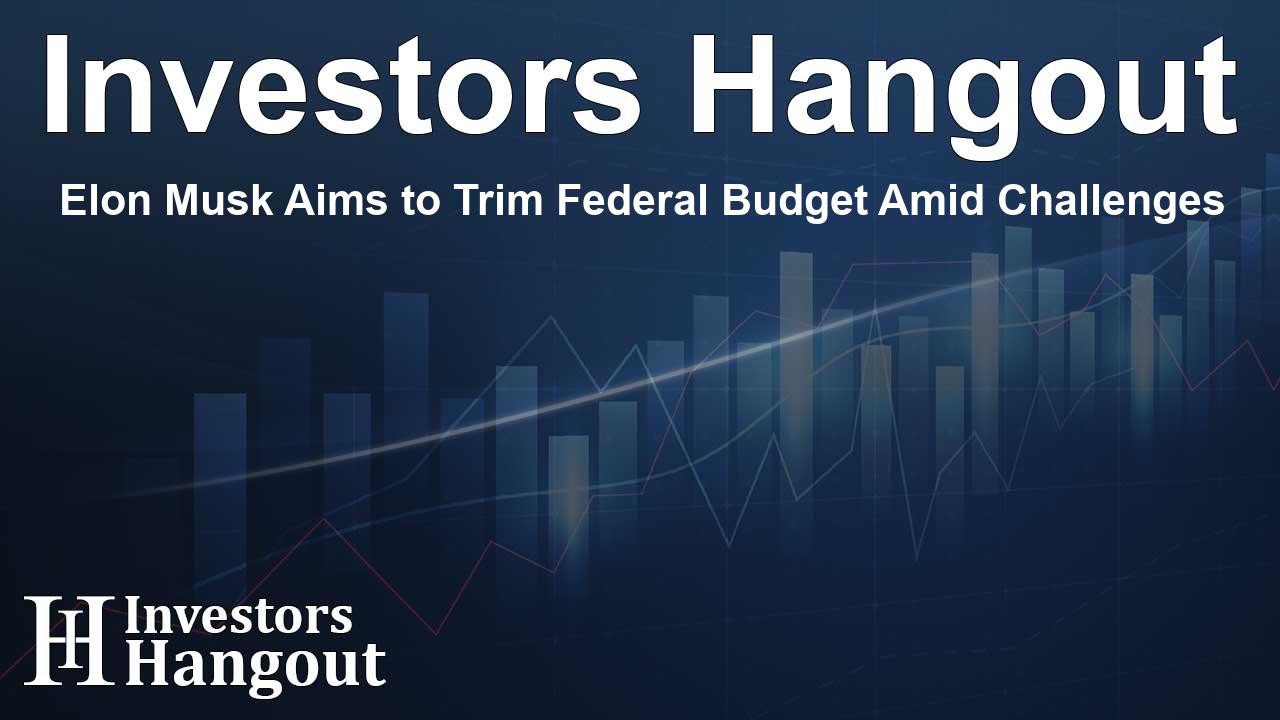Elon Musk Aims to Trim Federal Budget Amid Challenges

Elon Musk's Ambitious Federal Spending Goals
In a recent discussion, Elon Musk, a prominent business leader, expressed his thoughts on the U.S. government's budget challenges. He has been appointed by the President-elect to head a new government cost-cutting initiative, where he is tasked with the significant challenge of reducing spending by up to $2 trillion from the federal budget of $6.8 trillion. Musk acknowledges that achieving this ambitious goal is likely to be a long shot.
Musk candidly stated, "I think if we try for 2 trillion, we've got a good shot at getting 1," suggesting that while reaching the full amount may be unlikely, making a substantial reduction is still within the realm of possibility. His remarks were made during a conversation with political strategist Mark Penn, who has a wealth of experience in analyzing political landscapes.
The Formation of the Department of Government Efficiency
As part of this effort, Musk, who is also known as the CEO of Tesla (NASDAQ: TSLA), has been named to lead an initiative called the Department of Government Efficiency (DOGE). This task force, which also includes former presidential candidate Vivek Ramaswamy, is focused on enhancing the government’s efficiency by cutting excessive spending and regulations that limit effective governance.
Current Federal Spending Landscape
Addressing the monumental task at hand, Musk recognizes the existing complexity in federal spending allocations. With approximately two-thirds of federal expenditures being dedicated to essential programs—such as Social Security and Medicare for seniors, veterans' benefits, and interests on the increasing national debt, which stands at about $36 trillion—any cuts will necessitate a careful balancing act. Many of these programs have been protected by promises made by the Trump administration.
Initial Challenges and Strategies
The pursuit of spending cuts comes at a critical time as the President-elect begins to engage with congressional Republicans to set a legislative agenda. Key priorities include implementing tax cuts and enforcing measures to curb illegal immigration. However, aligning on a strategy has proven to be a challenge, as lawmakers grapple with differing priorities and approaches.
Potential Outcomes and Future Implications
If Musk's team can succeed, the implications would be far-reaching, potentially affecting various sectors reliant on government funding. Proponents of budget cuts argue that fiscal responsibility is essential for sustainable growth, while critics warn against the risks associated with significant reductions in vital services that millions of Americans rely on.
As the landscape of U.S. public policy continues to shift, all eyes will be on how Musk and his team navigate this intricate task. How they handle negotiations with stakeholders in government and the public will likely dictate the success of their efforts and influence the broader narrative of fiscal responsibility.
Frequently Asked Questions
What is the goal of Elon Musk's initiative regarding federal spending?
Elon Musk aims to cut $2 trillion from the $6.8 trillion federal budget, although he recognizes this goal may be ambitious.
Who else is involved in the Department of Government Efficiency?
Vivek Ramaswamy, a former presidential candidate, is also a key member of the initiative alongside Musk.
What are the main areas of federal spending that may be affected?
Key areas include Social Security, Medicare, defense, and veterans' benefits which are often considered untouchable in budget cuts.
How is the legislative agenda shaping up under the new administration?
The President-elect is meeting with congressional Republicans to outline priorities, including tax cuts and immigration reform.
What challenges does Musk foresee in implementing spending cuts?
Musk anticipates significant challenges due to the complexity of existing federal commitments and the need to negotiate with numerous stakeholders.
About The Author
Contact Lucas Young privately here. Or send an email with ATTN: Lucas Young as the subject to contact@investorshangout.com.
About Investors Hangout
Investors Hangout is a leading online stock forum for financial discussion and learning, offering a wide range of free tools and resources. It draws in traders of all levels, who exchange market knowledge, investigate trading tactics, and keep an eye on industry developments in real time. Featuring financial articles, stock message boards, quotes, charts, company profiles, and live news updates. Through cooperative learning and a wealth of informational resources, it helps users from novices creating their first portfolios to experts honing their techniques. Join Investors Hangout today: https://investorshangout.com/
The content of this article is based on factual, publicly available information and does not represent legal, financial, or investment advice. Investors Hangout does not offer financial advice, and the author is not a licensed financial advisor. Consult a qualified advisor before making any financial or investment decisions based on this article. This article should not be considered advice to purchase, sell, or hold any securities or other investments. If any of the material provided here is inaccurate, please contact us for corrections.
